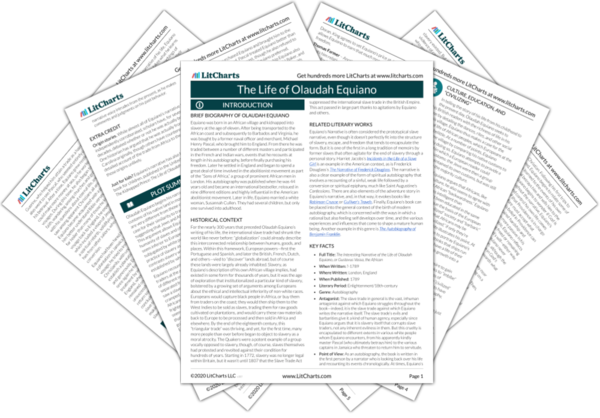As Equiano relates the story of his life and his travels between Africa, England, and the British Empire, he tells a story of the development of his self—the forging of his individual identity—which proves vital to the broader political purpose of his story. Equiano, who seeks to convince readers of the inhumanity of the slave trade, must first convince readers that he, a former slave, is fully human. The very act of relating his development over time—his joys, sorrows, and the lessons he learns—allows Equiano to make the case that he has an interior self, just like his mostly white readers, and that he too is a human being who can reason and feel as deeply as anyone else. By emphasizing the development of his sense of self over time, and insisting on the humanity of all black people, Equiano hopes to persuade his readers that slavery is an inhumane practice that deals not with inanimate pieces of property, but with people not altogether different from white Englishmen.
Selfhood ThemeTracker

Selfhood Quotes in The Life of Olaudah Equiano
I now wished for the last friend, death, to relieve me; but soon, to my grief, two of the white men offered me eatables; and, on my refusing to eat, one of them held me fast by the hands, and laid me across, I think, the windlass, and tied my feet, while the other flogged me severely. I had never experienced any thing of this kind before, and although, not being used to the water, I naturally feared that element the first time I saw it, yet nevertheless, could I have got over the nettings, I would have jumped over the side, but I could not; and besides the crew used to watch us very closely, who were not chained down to the decks, lest we should leap into the water. I have seen some of these African prisoners most severely cut for attempting to do so, and hourly whipped for not eating.
For I will not suppose that the dealers in slaves are born worse than other man. No; it is the fatality of this mistaken avarice, that it corrupts the milk of human kindness and turns it to gall. And, had the pursuits of those men been different, they might have been as generous, as tender-hearted, and just, as they are unfeeling, rapacious, and cruel. Surely this traffic cannot be good, which spreads like a pestilence, and taints what it touches! Which violates that first natural right of mankind, equality; and independency; and gives one man a dominion over his fellows which God could never intend! For it raises the owner to a state as far above man as it depresses the slave below it; and, with the presumption of human pride, sets distinction between them, immeasurable in extent, and endless in duration!
As we sailed to different islands, I laid this money out in various things occasionally, and it used to turn to very good account, especially when we went to Guadaloupe, Grenada, and the rest of the French islands. Thus was I going all about the islands upwards of four years, and ever trading as I went, during which I experienced many instances of ill-usage, and have seen many injuries done to other negroes in our dealings with whites.
I could not help thinking, that, if any of these people had been lost, God would charge me with their lives; which, perhaps, was one cause of my labouring so hard for their preservation; and indeed every one of them afterwards seemed so sensible of the service I had rendered them, that while we were on the key I was a kind of chieftain amongst them.
Montserrat, 26th of the Seventh Month, 1767.
The bearer hereof, GUSTAVUS VASSA, was my slave for upwards of three years, during which he has always behaved himself well, and discharged his duty with honest and assiduity.
ROBERT KING.
To all whom this may concern.
I now learned that after I had left the estate which I managed for this gentleman on the Musquito shore, during which the slaves were well fed and comfortable, a white overseer had supplied my place: this man, through inhumanity and ill-judged avarice, beat and cut the poor slaves most unmercifully; and the consequence was, that every one got into a large Puriogua canoe, and endeavored to escape; but, not knowing where to go, or how to manage the canoe, they were all drowned; in consequence of white the Doctor’s plantation was left uncultivated, and he was now returning to Jamaica to purchase more slaves and stock it again.
Population, the bowels, and surface of Africa, abound in valuable and useful returns; the hidden treasures of centuries will be brought to light and into circulation. Industry, enterprise, and mining, will have their full scope, proportionably as they civilize. In a word, it lays open an endless field of commerce to the British manufacturers and merchant adventurers. The manufacturing interest and the general interests are synonymous. The Abolition of slavery would be in reality an universal good.











